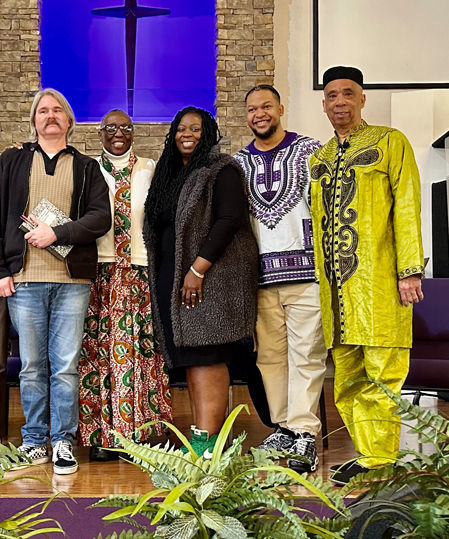NAACP DeKalb Black History Committee, chaired by Dee Smith, hosted a panel discussion on Saturday, February 4, 2023 centered around the attack on Black History in the state of Georgia. Brian Kemp, Governor of Georgia, signed HB1084 in 2022, called the “Protect Students First Act,” which limits what can be said about race during classroom discussions so as not to make “people” uncomfortable about their race in classrooms. This bill is one of several bills in the United States that attempts to make it a crime to discuss race in the classroom. Some teachers have been fired because of similar bills in other states.
The branch assembled a group of legislators, lawyers, educators, and activist to discuss how HB1084 impacts teaching of black history in the Georgia school classrooms. The panel consisted of: Rep. Mary Margaret Oliver, GA State Representative and lawyer, Craig Goodmark, Civil Rights Lawyer, Jeff Corkill, teacher and activist, Anthony Downer, educator and community organizer, Koan Roy Meighoo and Julian Fortuna, students and JADE Project organizer, and Deidra Wright, educator and parent advocate. The program was live at Rainbow Park Baptist Church and streamed over the internet.
These members of the community explained how restrictive HB1084 has been for teachers and the price some educators are paying. In addition they provided information about the law suit against the state of Georgia and what the community can do to insure that black history is taught in our schools. The panelist answered questions from the audience and gave suggestions for how to get involved to insure our history is taught in the schools. VIEW THE BROADCAST OF THIS EVENT HERE.
Here is a video that gives some background on the attack of African History.
Below are answers for some of the questions that we did not have time to answer at the event.
Questions from the NAACP DeKalb Black History Month Program
- What is CRT?
Critical Race Theory (CRT) is not taught in Georgia schools. That is the most important information about CRT. It was officially organized in 1989, at the first annual Workshop on Critical Race Theory, though its intellectual origins go back much farther, to the 1960s and ’70s. It examines how the law and legal institutions serve the interests of the wealthy and powerful at the expense of the poor and marginalized. It is taught in some Law Schools - American history is incomplete without black history. How are white people impacted when they do not get black history to complete the full history of this country?
White people maintain false notions of not only African Americans but they also develop a false sense of security about who they really are. - What should parents do when they are in a school system that is predominantly black school board members, black administrators, black teachers and black students yet, black history is rarely taught before slavery. Most of the history about us is after slavery. What can we do?
Teachers are required to submit lesson plans. Many of them have to “tow the lines” and follow the accepted way that white schools do in the state. We need to show up when we find out at the PTA meetings, the board meetings, and other places that will allow us.Parents can make suggestions to the principal and if that doesn’t work they can make a request to a member on the principal advisory committee and if that doesn’t work they can contact the assistant superintendent for the district and finally the superintendent…Or a parent could start a class within their communities or spearhead a committee and collectively develop a curriculum to provide to churches, schools, the NAACP and other community groups to use and request/advocate for that curriculum to be used.
- You have sued the state because of HB1084. What is the litigation strategy to stop the implementation of HB1084 while the case is going through the court system?As in many civil rights lawsuits, the party challenging the constitutionality of a law may request the court enjoin the government from enforcing the law while the case is pending by seeking a preliminary injunction. Since this case involves a law that is so vague it’s near impossible to comply with, such a procedure may be used here.
- How can parents, PTAs, and students advocate at the local school level for black history?Parents should maybe offer to establish and serve on a committee to fund and create monthly programs or activities to teach the students.
- What if you are not a parent or have children in the school district, but you are concerned and want to help promote black history in the schools.In DeKalb County Schools Principal Advisory Committee are established and meet quarterly and the meetings are open to all stakeholders. This would be a space we’re concerns are voiced. Or show up to board meetings and request that funding is set aside for Africana Studies.Our future is tied to our children’s future. Our community will continue to grow if we help these young people learn more about their history and their potential for future leadership. Even if you do not have children, you can get involved by joining community groups such as the NAACP DeKalb branch to advocate for a better way of life for the next generation of community. Join a community group and work to help us help the community.
- My 5 year old attends a predominantly white school. She raised her hand in class during reading circle and said her grandma took her to the Black History Museum where they showed white people beating all the Black people. After the session all the other kids were allowed to get jellybeans, but my daughter was not allowed the treat. I received a call that evening from the teacher accusing me of teaching violence to my child and that was why my child did not get jelly beans. What should a parent do in a situation like this?
I would report this teacher to the administration. Not only did you deny your child full participation in the school activities, but the teacher allowed her personal biases and/or lack of history to influence how she approached you as a parent. I think that before you attack, you ask questions to get a better understanding of the situation.Contact Goodman the attorney and sue. Civil Rights violation and child welfare issue. Parents can make suggestions to the principal and if that doesn’t work they can make a request to a member on the principal advisory committee and if that doesn’t work they can contact the assistant superintendent for the district and finally the superintendent… Or a parent could start a class within their communities or spearhead a committee and collectively develop a curriculum to provide to churches, schools, the NAACP and other community groups to use and request/advocate for that curriculum to be used.
NAACP DeKalb Black History Month Panel Discussion – Our History Is Under Attack – YouTube

